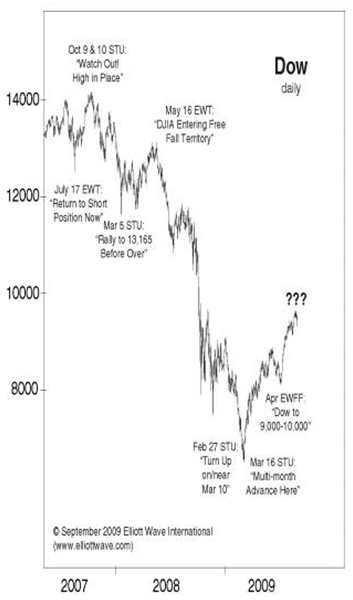By Nico Isaac
In recent months, Elliott Wave International President Bob Prechter has become something of a household name. In the final two days of August 2009 alone, Bob was mentioned by several news outlets from MarketWatch to the New York Times. The claim to his "fame" —
EWI was one of the only technical analysis firms to anticipate a sharp rally in U.S. stocks as they circled the drain of a 12-year low this spring, a feat made ever more exceptional considering the widespread image of Bob as being the ultimate "Big, Bad Bear."
The lesson? Believe in the facts, not in the "widespread image."
Bob Prechter has always said that successful forecasting should look to the current wave count (and various other technical measures) for direction. He has never permanently tied himself to the mast of definition — i.e. "bull" or "bear."
For this reason, EWI’s team of analysts have been able to stay one step ahead of the biggest turning points in the Dow Jones Industrial Average, from the very start of the index’s historic 2007 reversal.
To wit: This two-year chart of the Dow incorporates several calls from our past publications as they coincided with the market’s most memorable peaks and troughs:

——————————————————————
For more analysis from Robert Prechter, download a free 10-page July issue of Prechter’s Elliott Wave Theorist.
——————————————————————
The chart above presents the abstract details of our past analysis. Here is the expanded version of those insights as they appeared in real-time:
July 17, 2007 TheElliott Wave Theorist:
"Aggressive speculators should return to a fully leveraged short position now. We may be early by a couple of weeks, but the market has traced out the minimum expected rise, and that’s enough to act on."
Soon after, as the DJIA neared its own historic Oct. 11, 2007 apex, the Oct. 9 and 10 Short Term Update amped up the urgency of its analysis and wrote:
“Odds have increased that a market high is in place. The structure, coupled with turns in the other markets, suggests a top is in place. The potential, at the least, is four a large selloff… Watch Out! The market faces a stout correction."
Before landing at its March 10, 2008 bottom, the March 5 Short Term Update afforded respect to a bullish alternate count and wrote: "Prices should carry above the wave a high (13165) before it ends."
At its four-month high, the March 16 2008 Elliott Wave Theorist went on high, bearish alert and wrote: The DJIA is entering "Free Fall territory."
One week before the U.S. stock market landed at its 12-year low of March 9, our Feb. 27, 2009 Short Term Update utilized a traditional turning pattern to outline a specific time window for the onset of a major upside reversal. In STU’s own words:
"By all indication, this pattern is back on track… the turn will come on or near March 10, 2009. Anywhere in this time period may mark a turn, which will obviously be a market low."
Once the bullish winds of change had turned, the March 16 Short Term Update wrote:
"When the market speaks, it behooves us to listen. The implications of this are that the… major stock indexes are in the initial stages of a multi-month advance."
Finally, the April 2009 Elliott Wave Financial Forecast calculated a specific target range for the Dow’s rally: the 9,000-10,000 level.
So, now that the upside objective is met, where are prices set to go next? For more analysis from Robert Prechter, download a free 10-page July issue of Prechter’s Elliott Wave Theorist.
Robert Prechter, Chartered Market Technician, is the world’s foremost expert on and proponent of the deflationary scenario. Prechter is the founder and CEO of Elliott Wave International, author of Wall Street best-sellers Conquer the Crash and Elliott Wave Principle and editor of The Elliott Wave Theorist monthly market letter since 1979.

Comments are closed.